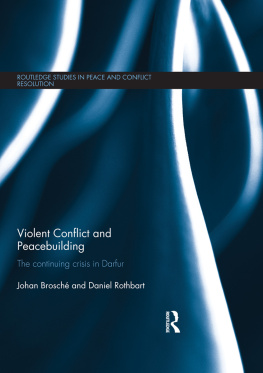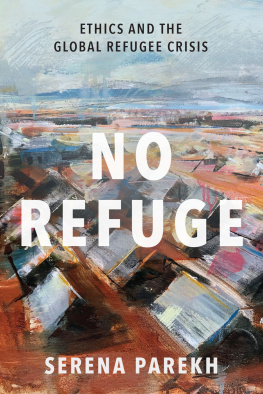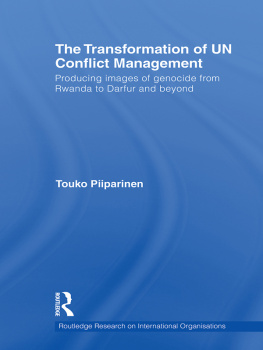
The War in Darfur
No other crisis in Africa has received as much attention in the West during the past ten years as the war in Darfur, yet the underlying complexities of the war and the background to the crisis remain poorly understood by scholars, activists and aid workers.
This anthropological study of the war in Darfur explores the personal experience of war from the perspective of those refugees who have fled from it and puts forward potential solutions to the conflict. Drawing on ethnographic research carried out in the refugee camps of neighbouring eastern Chad, The War in Darfur: Reclaiming Sudanese History gives a voice to people who to date have had little opportunity to articulate their experiences.
Through facilitating the telling of the refugees tale, examining what happened and how, this book will be an interesting contribution to the areas of refugee studies, anthropology and history.
Anders Hastrup holds a Ph.D. in anthropology from the University of Copenhagen. He has worked for different NGOs in Darfur and South Sudan and is the Director of The Danish Institute in Damascus.
Routledge Studies in Middle Eastern Society
1. The War in Darfur
Reclaiming Sudanese History
Anders Hastrup
The War in Darfur
Reclaiming Sudanese History
Anders Hastrup
First published 2013
by Routledge
2 Park Square, Milton Park, Abingdon, Oxon OX14 4RN
Simultaneously published in the USA and Canada
by Routledge
711 Third Avenue, New York, NY 10017
Routledge is an imprint of the Taylor & Francis Group, an informa business
2013 Anders Hastrup
The right of Anders Hastrup to be identified as author of this work has been
asserted by him in accordance with sections 77 and 78 of the Copyright,
Designs and Patents Act 1988.
All rights reserved. No part of this book may be reprinted or reproduced or
utilized in any form or by any electronic, mechanical, or other means, now
known or hereafter invented, including photocopying and recording, or in
any information storage or retrieval system, without permission in writing
from the publishers.
Trademark notice : Product or corporate names may be trademarks or
registered trademarks, and are used only for identification and explanation
without intent to infringe.
British Library Cataloguing in Publication Data
A catalogue record for this book is available from the British Library
Library of Congress Cataloging in Publication Data
Hastrup, Anders.
The war in Darfur : reclaiming Sudanese history / Anders Hastrup.
p. cm. (Routledge studies in Middle Eastern society)
Includes bibliographical references and index.
1. SudanHistoryDarfur Conflict, 2003 2. RefugeesSudanDarfur
Interviews. 3. RefugeesChadInterviews. 4. GenocideSudanDarfur.
5. Ethnic conflictSudanDarfur. I. Title.
DT159.6.D27H39 2012
962.4043dc23
2012025655
ISBN: 978-0-415-52487-2 (hbk)
ISBN: 978-0-203-07538-8 (ebk)
Acknowledgements
This work is the product of a collective effort the Darfurian Voices project. In 2009 I travelled across eastern Chad to meet refugees from the war in Darfur, an area of Sudan I had already lived and worked in for more than a year at the time. The organization, 24 Hours for Darfur, took me onboard and made me participate in the most comprehensive documentation project of Darfurian refugees and their views on issues of peace, justice and reconciliation. I was grateful for this opportunity and happy to be part of such an interesting and important project. I am especally grateful for being allowed to use the findings of the project in this work, including video interviews not undertaken by myself. Thanks to Managing Director of 24 Hours for Darfur, Jonathan Loeb, Advocacy Director Benjamin Naimark-Rowse, and Research Director Matthew Bowlby. Thanks to the Darfurian Voices team. They are: Ethan Siller, Chad Hazlett, Abdelbagy Abushanab, Abdelrahim Kadok, Awad Hassan, Aziz Idriss, Aziza Al Sheikh, Basmat Ahmed, Chama Hassan Mohamed, Collin Raymond, Djafar Abakar Mohamed, Elnour Adam, Hissein Idris Adam, Kerim Abdel Bachar, Khamis Awat Souleyman, Mahassan Izzadine, Mohialdin Abdullah, Munira Mohamed, Suad Mansour, Siddick Adam Issa, Zeinab Suleiman and Zuhair Bashar. Jrme Tubiana who was also part of the team greatly helped me understand much of the background of the history of Dar Zaghawa and introduced me to new friends. Thanks to Chris Farber who filmed most of the interviews and whose stills appear in this work.
Thanks to Michael Irving Jensen for providing contact to the organization 24 Hours for Darfur. Thanks to Professor Jrgen Bk Simonsen who provided fruitful comments along the way in his supervision of the Ph.D. thesis that became this book, and thanks to the Danish Research Council for the Humanities for providing the grant that enabled the research. Thanks to my colleagues Andreas Bandak, Rasmus Christian Elling, Sune Haugblle, Leif Manger, Lars Hjer, John Ryle and Victor Tanner who provided fruitful feedback along the way. Thanks also to Hiam Fouad Abbas, Al Tom Salim Adam, Tong Lual Ayat, Rekha Das, Zulfa Mohammed Eisa, Abd al Ghani, Lotte Grauballe, Malene Haakanson, Al Sadiq Ahmed Harba, Nesya Hughes, Joann Kingsley, Asbjrn Lode, Amna Ali al Mahdi, Ghor Dhal Maniyel, Abdul Wahid Pedersen, Tom White, Nizar al Sheikh, Tijani and Alfredo Zamudio.
I have been both happy and honoured to have discussed my findings with Wendy James and I owe special thanks to the profound attention she has offered my work over the years. I also owe a deep thanks to Rex Sean OFahey, who has read through some of the interviews. We have had many fruitful and interesting discussions about Darfur both past and present and about how one can write the history of this troubled region since 2003. It has been a privilege to discuss the history of Darfur with the leading expert in the field.
I owe a very special thanks to my mother Kirsten and my sister Frida who read the manuscript and provided invaluable support and encouragement both here and there.
Lastly, and most importantly, I dedicate this book to the displaced in Darfur and the Darfurian refugees in eastern Chad. Although their situation remains bleak and they have no return in sight in any immediate future, the displaced and the refugees I have met and the people interviewed in this work have shown a profound ability to see beyond their immediate despair and challenging circumstances. In spite of having witnessed a man-made humanitarian disaster of great proportions, I have come back from Darfur and eastern Chad enlightened and oddly enthused with new understandings that have enriched my life much beyond what can be reflected in this work.
A note on translation and transcription
This is not a work of philology. I transcribe Arabic words in both Darfur and Modern Standard Arabic throughout the book. I have not included a word-by-word transcription, but have attempted to include the terms that are of relevance in their own right as they are often repeated and form vital components of the semantics at play in an analysis of this kind. The letter ayn is indicated by the apostrophe followed by a (such as maa meaning with). The long a-vowel alif is indicated by double aa (such as maal meaning livestock in Darfurian Arabic). The hamza glottal stop is also marked by an apostrophe (such as in raiis , meaning president). The sound plural endings are indicated by double vowels (such as muhammashiin , meaning marginalized and in feminine khawajaat , meaning foreigners).







